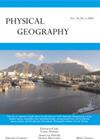埃塞俄比亚东南部干旱事件的时空变异和趋势
IF 1.4
4区 地球科学
Q4 ENVIRONMENTAL SCIENCES
引用次数: 4
摘要
摘要:需要了解干旱事件的时空变异性,以制定强有力的抗旱和适应策略。本研究评估了埃塞俄比亚东南部干旱事件在多个时间尺度上的时空变异性(3个月、6个月、12个月和24个月,以及三个空间不同的雨季;3月至5月、6月至9月和9月至11月)。使用标准化降水指数(SPI)生成了34个站点的干旱指数。结果表明,干旱发生的频率和程度在邻近站点之间没有明确的空间格局。12个月和24个月的SPI证实,在1970年至2015年期间,研究区域的一些站点没有一年没有干旱(SPI≤−1)。趋势测试表明,干旱程度、持续时间和地理覆盖范围都在增加。全年、24个月和3-5月干旱程度的增加趋势在0.05水平上具有统计学意义。3个月时间尺度上的干旱持续时间也显示出统计学上的显著增加。这项研究的结果提供了多个时间尺度的相关干旱信息,有助于支持埃塞俄比亚东南部的干旱管理。本文章由计算机程序翻译,如有差异,请以英文原文为准。
Spatiotemporal variability and trends of drought episode in southeastern Ethiopia
ABSTRACT There is a need for scientific knowledge on the spatiotemporal variability of drought episodes to establish robust drought mitigation and adaptation strategies. This study evaluates the spatiotemporal variability of drought episodes in southeastern Ethiopia at multiple time scales (3-, 6-, 12- and 24-month and three spatially different wet seasons; March–May, June–September and September–November). Drought indices were generated for 34 stations using the standardized precipitation index (SPI). The results show that the frequency and magnitude of drought episodes do not have a clear spatial pattern among nearby stations. The 12- and 24-month SPI confirm that there has not been a year without drought (SPI≤ −1) between 1970 and 2015 at some stations in the study area. The trend tests show that drought magnitude, duration and geographical coverage are increasing. The increasing trends in drought magnitude at the annual, 24-month and during the March–May season were statistically significant at 0.05 level. Drought duration at 3-month time scale also showed a statistically significant increase. The results of this study provide relevant drought information at multiple time scales that is useful for supporting drought management in the southeastern Ethiopia.
求助全文
通过发布文献求助,成功后即可免费获取论文全文。
去求助
来源期刊

Physical Geography
地学-地球科学综合
CiteScore
3.60
自引率
0.00%
发文量
18
审稿时长
6 months
期刊介绍:
Physical Geography disseminates significant research in the environmental sciences, including research that integrates environmental processes and human activities. It publishes original papers devoted to research in climatology, geomorphology, hydrology, biogeography, soil science, human-environment interactions, and research methods in physical geography, and welcomes original contributions on topics at the intersection of two or more of these categories.
 求助内容:
求助内容: 应助结果提醒方式:
应助结果提醒方式:


